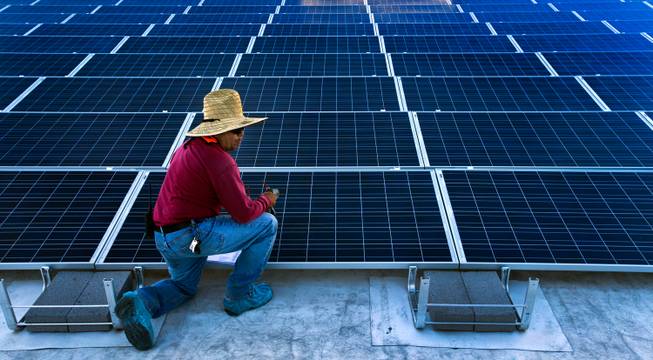
Fernando Ortega with NRG Energy continues work on the worlds largest convention center rooftop solar array at the Mandalay Bay on Thursday, October 23, 2014.
Tuesday, July 28, 2015 | 2 a.m.
The debate over renewable energy in Nevada has raged in the Legislature and at the Public Utilities Commission for over a year. Now, the issue could be taking center stage in the 2016 presidential campaign, following a recent proposal from Democratic front-runner Hillary Clinton to install more than half a billion solar panels across the nation by 2021.
But as Nevada has seen, solar panels generate more than just electricity — they also produce political controversy.
Clinton's plan, which also calls for generation of enough renewable energy to power every home in America by 2027, would require a 700 percent increase in solar energy production, in addition to significant increases in wind and geothermal energy.
If implemented, it could provide a major boost to the industry in Nevada, say solar advocates, who see Nevada’s abundant swaths of land as the basis for an expanded amount of renewable use. "While some states may have only one option, like wind, Nevada has solar, wind and geothermal," said Dwayne McClinton, a renewable energy consultant. "We're just barely scratching the surface."
Nevada ranked third behind California and North Carolina for total solar energy produced in a recent survey and leads the nation in solar jobs per capita, according to the Solar Energies Industry Association. In the past two years, four new projects — two solar and two geothermal — have been approved for Nevada, with combined investment totaling more than $1.4 billion.
But, not all industry watchers are optimistic about the goal that Clinton is proposing.
"I think everybody likes the phrase 'clean energy.' It all sounds nice," said Chantal Lovell, spokeswoman with Nevada Policy Research Institute, a conservative think tank. "What often gets lost is the cost of doing it. People have no choice but to pay the higher rates."
NV Energy and the solar industry have recently clashed over a state-mandated cap on new solar installations. While solar industry advocates say the cap threatens the growth of their industry, NV Energy has contended a rapid expansion of the use of solar could unfairly burden other ratepayers. It’s a controversy that could expand to other states were Clinton’s proposal to come to fruition.
Former Maryland Gov. Martin O'Malley, another Democratic presidential candidate, has issued a policy proposal calling for the country to rely fully renewable electricity by 2050.
While Democratic candidates have signaled a focus on increasing renewable energy sources, Republican candidates have offered alternatives. Former Florida Gov. Jeb Bush has said that he wants to cut subsidies to both the renewable and conventional energy industries. Though he questionsthe role of human activity in climate change, during his time in the Florida state legislature, Sen. Marco Rubio supported tax incentives for renewable energy. Texas Sen. Ted Cruz favorsrepealing regulations on the energy industry, while Scott Walker and Bobby Jindal, governors of Wisconsin and Louisiana, respectively, have sought to block President Barack Obama's ability to restrict carbon pollution from power plants.

Join the Discussion:
Check this out for a full explanation of our conversion to the LiveFyre commenting system and instructions on how to sign up for an account.
Full comments policy